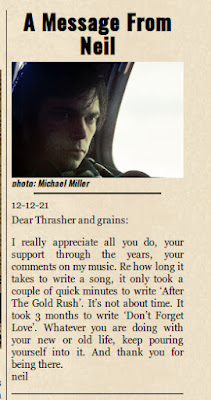"Cortez The Killer" Concert Video - Neil Young & Crazy Horse, Casa de Campo, Madrid, 25/4/87
Since folks seem to be enjoying the Crazy Horse video cuts lately, here's another one.
"Cortez The Killer" by Neil Young & Crazy Horse at Casa de Campo, Madrid on April 25, 1987. Not as long as the 22 minute 2001 version posted the other day, but a respectably "short" 13 minute searing version. Compare and contrast the evolution over the years.
A pretty happening video, audience shot in front, with some interesting, intense guitar work by Neil on Ol Black.
Neil Trivia du jour... “Cortez The Killer”, was banned in Spain because it offended General Franco’s regime. In Spain, Hernando Cortez (or Hernán Cortés) is considered a national hero as the conquistador who conquered Mexico's Aztec Empire for Spain.
So what's up with the song "Cortez The Killer"? Well, the time shifting from past, present and future is pretty mind-bending, despite what some historical purists might think about the song's accuracy. From the article American Educator - Cultural Literacy Rocks by Matthew Davis, who has some quibbles with Young's lyrical/historical record:
"The romanticizing of the Aztecs begins in the opening lines, when Young claims that all of these native peoples were beautiful and healthy, a condition which has probably never prevailed in any civilization at any time.
Young also glides over the subject of human sacrifice. It is true that the Aztecs "offered life in sacrifice / So that others could go on." They believed that such sacrifices would appease the gods. But the lives they sacrificed were human lives: sacrificial victims were tied to an altar, whereupon their chests were sliced open and their still-beating hearts offered to "the angry gods." By avoiding the fact that the Aztecs killed human beings and emphasizing the unselfish motives behind these sacrifices, Young puts a cheerful face on a terrible practice and presents a one-sided view of the Aztecs.
"Hate was just a legend, / And war was never known," is more of the same kind of romanticizing, all too common today. The residents of pre-Columbian Mexico were well acquainted with hate and war. In fact, the Aztecs stand out in the annals of history as an exceptionally belligerent civilization: In order to keep their altars supplied with a steady diet of sacrificial victims, the Aztec emperors kept up a perpetual war with neighboring peoples.
It would be more accurate to say that "peace was never known."
In an interview in Mojo Magazine in 1995, Neil Young is asked about Cortez The Killer and where he gets his information:
YOUNG:" It was a combination of imagination and knowledge. What Cortez represented to me is the explorer with two sides, one benevolent, the other utterly ruthless I mean, look at Columbus! Everyone now knows he was less than great and he wasn't even there first (laughs). It always makes me question all these other so-called 'icons' (smiles). "
During a show in Manassas, VA on August 13, 1996, Neil said that he'd written Cortez in high school while suffering "Montezuma's Revenge". Incidentally, we attended the Manassas '96 concert & it was awesome. Now that said, he may have just been joking around when he made the comment.
Hence the album title 'Zuma, we suppose.
And Crazy Horse's Frank "Poncho" Sampedro discussed the situation surrounding the "missing verse" of Cortez in an interview with Rolling Stone by Andy Greene:
RS: The story goes that when you guys cut "Cortez the Killer," the board went down and you lost the entire last verse. Is that true?
Frank "Poncho" Sampedro: Yeah. True. Check it out.
What David Briggs did …We didn't know the power went out. In the room we were playing we had power, but where he was recording, in the control room, they lost power. When they got power back up and running, David ran the tape back and listened to right where he lost us and kept listening to us playing, and then he punched and started the tape back in right in time with where we where. [Laughs]
So that verse is gone.
So will the missing verse of "Cortez the Killer" ever be re-stored? Or has it been lost forever to the ages? [Cries]
And Young's reaction to hearing the loss of the recorded verse? "I never liked that verse anyway", and it has never been performed live (source).
Labels: cortez the killer, crazy horse, neil young, video































 Human Highway
Human Highway

















 Concert Review of the Moment
Concert Review of the Moment





 This Land is My Land
This Land is My Land

 FREEDOM In A New Year
FREEDOM In A New Year









 *Thanks Neil!*
*Thanks Neil!*




![[EFC Blue Ribbon - Free Speech Online]](http://www.thrasherswheat.org/gifs/free-speech.gif)











 The Unbearable Lightness of Being Neil Young
The Unbearable Lightness of Being Neil Young Pardon My Heart
Pardon My Heart



 "We're The Ones
"We're The Ones  Thanks for Supporting Thrasher's Wheat!
Thanks for Supporting Thrasher's Wheat!




 This blog
This blog 
 (... he didn't kill himself either...)
#AaronDidntKillHimself
(... he didn't kill himself either...)
#AaronDidntKillHimself









































































 Neil Young's Moon Songs
Neil Young's Moon Songs




 Civic Duty Is Not Terrorism
Civic Duty Is Not Terrorism Orwell (and Grandpa) Was Right
Orwell (and Grandpa) Was Right


 What's So Funny About
What's So Funny About 



20 Comments:
This comment has been removed by a blog administrator.
Cortez is a metaphor for lost love, a common Neil Young songwriting theme in those days. It starts out with courtship (he came dancing across the water), moves on to physical love/sexual imagery (women all were beautiful, men stood straight and strong), bliss (hate was just a legend, war was never known), then to the inevitable heartbreak and longing (I know she's living there...I still don't know how I lost my way).
Cortez, the relationship killer. Remember, this was written as Neil was coming out of his doom years. He was processing a lot in his personal life. I can't help but think Cortez was a part of that.
Melodically and lyrically, it's simple and brilliant. Amazing that after nearly 4 decades, that song never grows tired, or old. T, maybe you can find the 1999 Oakland acoustic performance to put up here. Stunning!
If I recall correctly, Neil wrote this song when he was a teenager. I could be wrong, but I seem to remember hearing that.
Also, whoever is critiquing the accuracy of the depictions and content of the song is taking a view of it that I think is way too literal.
Like the previous poster indicated, the song itself could be a metaphor for love.
I personally think it's more an account that reaches into fables and stories about history and tries to capture the magic of the imagination.
Romanticizing the Aztecs is Neil's way of expressing that emotional tug of human history, invoking the wonder and mystery of lost civilizations.
It's not meant to be accurate, it's meant to evoke a feeling. I think Neil has a pretty strong relationship with the past, not necessarily in the context of truth more than in the sense of what it makes him feel. He hears the echoes of lost times and lost civilizations and channels those reverberations through his songs.
It doesn't have to be historically accurate. It IS romantic. That's the point of it. Whatever it is another layer down, a metaphor for lost love, or something to that effect, that's likely personally interpretive, but a really cool way to look at it too.
I should also add that Neil appears to identify personally with lost native civilizations and cultures, almost as if he is one of them.
He assumes the identity of an Aztec here, and in Pocahontas he assumes the identity of an American Indian. Both (and this is conjecture) are like ghosts haunting his mind.
Like when Jim Morrison said that the ghost of a dead Indian jumped into his body and possessed him (though with a less narcissistic motive).
Matthew L.-I actually read that metaphor interpretation somewhere years ago, so it's not exclusively mine. It does make sense to me, though.
Analyzing Neil's songs is like explaining a joke: when you start to pick it apart, all the humor (or in Neil's case) the romanticism disappears.
@Matthew - Good call.
During a show in Manassas, VA on August 13, 1996, Neil said that he'd written Cortez in high school while suffering "Montezuma's Revenge".
We attended the Manassas '96 concert & it was awesome. Now that said, he may have just been joking around when he made the comment.
Hence the album title 'Zuma, we suppose.
Zuma Beach is a northern neighborhood in Malibu, CA where Neil lived when he recorded "Zuma."
Cortez el asesino!
Interestingly Franco died 10 days after the Zuma Album was released(in the US). Did they release the album in Spain without that song on it or did they stop the whole album from being released?
And when was the ban lifted? Funny to think if the release date had been postponed just two weeks it probably wouldn´t have been banned in the first place (Franco was already in a coma by the time the album should have been released).
History certainly is ironic. Cortez The Dictatorship Killer...
Does anyone know more about the exact spanish release history of Cortez/Zuma?
@ setlistthief - we tend to agree about the over analysis and we've plead guilty on this quite often.
That said, when you look at how songs like "Southern Man" and "Alabama" have been misunderstood, for example, then maybe some analysis and context can be helpful in putting to rest urban myths and misunderstandings.
But point taken regarding the romanticism ... love and only love.
Just mention the name of "Franco" and I hear Chevy Chase saying on Weekend Update on SNL, "President Generalissimo Francisco Franco is still dead."
I am wondering about the ban, too. Is that why Neil doesn't show up over there until 1985 or so? It was because of censorship?
I suspect Mark Davis is racist or at least was educated in an environment emphasizing white superiority because "barbaric" human sacrifice wasn't reserved to just non-white civilizations.
There were other thriving, advanced civilizations like the Aztecs playing their own little game of "human sacrifice" in the name of God, Crown, and Countryman.
For example, quartering bodies, slicing up the middle to remove their entrails, is pretty barbaric no matter what country or king or religion is providing the "entertainment."
Yes, Mark, it was ritualized entertainment for the entire family!
As far as I know, Cortez was only banned in the cover, iwas called "Cortez Cortez", instead of Cortez the Killer, but the song was in the album. My vinyl copy is not the original edition, but it has "Cortez Cortez" in the back cover, and "Cortez the Killer" in the label of the vinyl. Absurd? Yes. And I think it would had been banned ten days later, Franco died, but censorship not until some years later. In fact, it stills happen in some ways.
Remember nobody expects the Spanish Inquisition, Mark?
They were bloody barbarians indulging on a little human sacrifice and purification of their own.
Let me guess, American Educator is some kind of right-wing religious group or blog electing bible toting morons into public service to advance their white-Eurocentric racist view of American history.
Rrrrgggh....
Interesting commentary so far. Just an additional note about album cover / track list editing; if I remember correctly the Korean pressing of On The Beach deleted the track "Revolution Blues" from the cover...not sure if the track was on the vinyl. My guess is that it was censored for the title only, not the content. Maybe a topic for another thread Thrasher.
Ray
@Thrasher-I do love reading Neil's lyrics and trying to figure out what he's saying. Maybe I should start a blog... :-)
Setlistthief, you have a gift at lyrics. I can barely make out the word verifications to prove I'm not a robot.
What would be more amazing is if he wrote this when he was a teen like Matt mentioned. I think I read that in the Gospel According to Shakey who is quite an authority on the life and times of Neil Young.
This comment has been removed by the author.
glorious version thanks peace
A historical footnote on Cortez the Killer's now mythic "missing last verse". This was in fact performed live in Hamburg on 29 April 2003 on Neil's solo European acoustic tour:
'The ship was breaking up on the rocks
and the sandy beach so close'
This line suggests a different history in which Cortez is shipwrecked and never makes it ashore.
@Simon - oh really? Very interesting. Did not know that and will have to track that down sometime.
Thanks for letting us know.
@Thasher
Here ya go:
http://www.youtube.com/watch?v=-If6YdZKBJ4
(though I´m not sure if that´s really the actual missing verse or just some adlibbed lines, just more like the latter to me, but we take everything we can get don´t we? ;-))
Post a Comment
<< Home